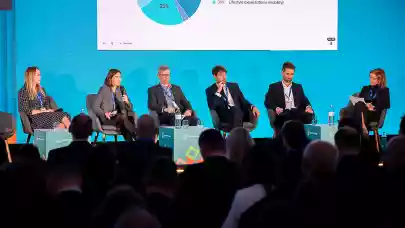
Jacek Wesołowski, Managing Director of Trei Real Estate Poland, has talked to Property Forum about the rising popularity of retail parks in Polish cities, the expansion in the PRS market and the challenges for the coming years.
You are currently developing a large (22,000 sqm GLA) retail park in Szczecin. How - apart from its scale, of course - will it differ from a ‘typical’ Vendo Park? Is the opening date of 2024 still unthreatened?
Vendo Park Szczecin is one of the most unique projects in our portfolio. We are developing it as part of a joint venture with investor Patron Capital. Its greatest distinction is, of course, its record size - it will be the largest retail park under the Vendo Park banner and at the same time one of the largest to open this year in Poland. Interest in this facility is very high because the retail park will be built in the northern part of the city, in Stołczyn, in a strategic location, as it is in the neighbourhood of a housing estate. For the local community, it will be a place that provides access to groceries and meets the demand for DIY, clothing and sports products.
We are in the final stages of the works and, as planned, it will open to customers as early as 28 November. In connection with this event, we are planning a number of attractions for customers who will visit our facility on that day, and we are currently working out the final details. However, we can already confirm that, among other things, a Vendo zone will be waiting for the participants, where they will be able to take part in competitions with prizes, for example. On that day, shops of such brands as Media Expert, JBB, Lidl, Action, Martes Sport, Maxi ZOO, Sinsay, Pepco, Euro AGD, Optyk Sekret, TEDi, Dealz, Rossmann, Hebe, Deichmann, Sowa, CCC, Verona, Berlin Doner Kebap and OBI will be opened. In December, the retail offer of Vendo Park Szczecin will also be expanded with a Jysk chain shop.
Do “classic” shopping malls still have a raison d'être in times of the growing popularity of retail parks?
It is true that the role of retail parks in the Polish retail real estate landscape is getting stronger as of 2020. According to the latest edition of the report ‘Retail parks and convenience centres in Poland’, which we have compiled in cooperation with the consulting firm JLL, retail parks account for 17% of retail space in Poland. This is a very high percentage, and it is likely to increase steadily in the coming years. This is due to the fact that retail parks are ‘entering’ smaller and smaller cities – approximately 44% of the formats created in 2024 are located in cities with less than 100,000 inhabitants. The majority of our 38 Vendo Parks are located in towns with less than 50,000 inhabitants. Shopping malls, on the other hand, are the domain of large agglomerations. Their position is still very strong there. Overall, however, now is the time of retail parks. For comparison: between 2000 and 2005, retail parks accounted for around 9% of new retail space. From 2018 to the present, it has already been 40%, with around 20% of space in shopping malls.

Jacek Wesołowski
Managing Director Poland
Trei Real Estate
You have recently announced the development of more than 1,000 PRS apartments by special purpose joint ventures. How do you go about finding partners for these projects?
The institutional rental market in Poland is only at the beginning of its development and saturation is at a very low level. In this aspect, we are still chasing Western European countries, where the PRS formula is extremely popular. In the context of the PRS market in Poland, we see great potential and an opportunity to benefit from the international experience of Trei Real Estate, which has a portfolio of more than 2.320 built flats in the PRS formula and is currently developing 12 projects offering 2.550 units for rent in Germany and the United States. By combining our experience with a market gap that needs to be filled, we become a trusted partner for the companies we work with, with whom we form joint ventures.
In which locations are you planning to develop your PRS portfolio?
In Poland, we are currently working on two PRS projects - in Poznań and Warsaw. In Poznań, the UP2U investment is under construction. It will be our first investment of this type in the country. It will provide approximately 20,000 sqm of mixed-use space, including 460 fully-furnished flats and about 875 sqm of space dedicated to additional services, including shops. The project is scheduled for completion in 2026. What's more, during the construction work associated with this development, modern prefabrication technology is being used, resulting in another storey being built in just one week.
In Warsaw, the Ostrobramska project will be developed. It will deliver around 600 rental flats to the local market. The development will be built in the Praga-Południe district, offering efficient access to the city centre by public transport, among other means. The building will be located close to parks and the Vistula River, and future residents will be able to take advantage of the well-developed retail and service offer in the immediate vicinity. Construction work is scheduled to be completed in 2027.
And what about your offer of ‘full-ownership’ flats? Will you be reducing it in favour of new PRS projects, or will it remain a strong part of your portfolio?
Classic residential developments continue to be a very important aspect of Trei Real Estate's business. We have very ambitious development plans in this market segment in Poland. We have already completed an investment in Wrocław, where the one-of-a-kind, green and award-winning Bacciarellego 54 estate with 277 flats, located, among others, in buildings with the character of urban villas, has been created. In Łódź, meanwhile, the Kraft estate was constructed, which introduced 191 flats to the local market and was very popular with customers right from the start. In Łódź, we have also started construction of our second residential development in the city – the Blask estate, which will provide 101 flats in the first phase. This experience gained also from the German and American markets, where our company also operates, allows us to implement further projects. We are planning new investments in Warsaw and Wrocław, and we are currently implementing a green and family-friendly investment in Milanówek near Warsaw, which will provide a total of 440 flats in a villa-like development.
High land prices, changes in the law regarding the energy efficiency of buildings, the expensive zloty - what do you think will be the biggest challenges for developers in Poland in 2025?
We are undoubtedly living in very uncertain times. The dynamic geopolitical situation and the economic challenges faced by investors and consumers alike are affecting the development market. Developers continue to face a limited supply of attractive land and inflation, which affects, among other things, the price of individual building solutions. Rising energy costs will also have a major impact on the development of the real estate sector.
At the same time, the real estate market is undergoing a very big transformation in terms of the need to make newly constructed buildings sustainable. This generates additional investment costs, but at the same time provides a competitive advantage and increases interest in a particular investment among customers or tenants, whose environmental awareness is constantly growing.
All of this will require investors to be highly adaptable and look for optimal solutions, e.g. in terms of financing their activities.




